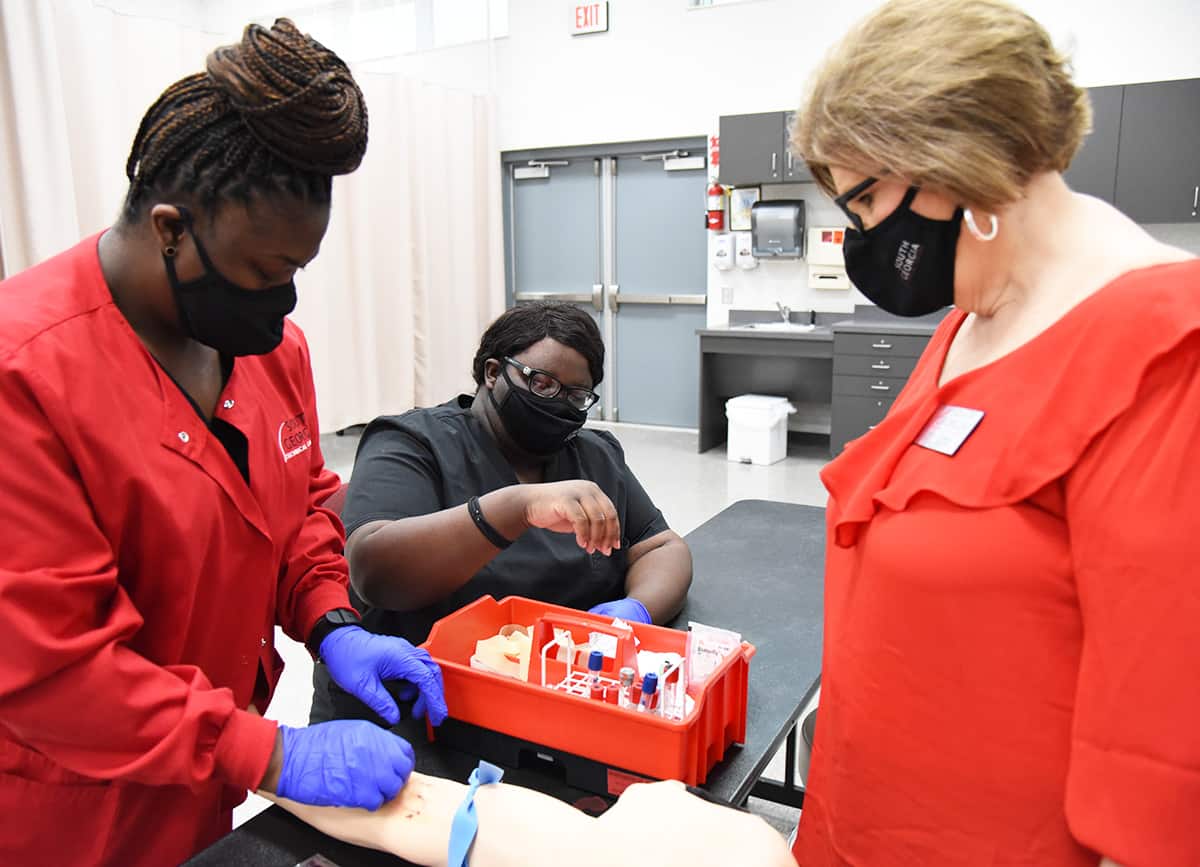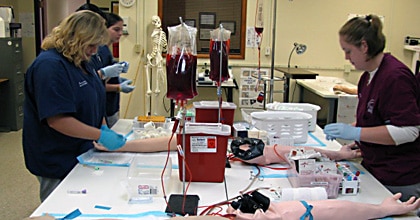Phlebotomy Training Course Success Tips: Networking Strategies
Phlebotomy Training Course Success Tips: Networking Strategies
Blog Article
The Path to Qualification: Recognizing the Phlebotomy Educating Course Trip and Its Importance
As you think about the course to certification in phlebotomy, it is very important to understand the role you'll play in medical care. Your training will certainly cover essential skills, from blood collection strategies to patient interaction. Each component of the program prepares you for the challenges ahead. What specifically does the journey require, and why is certification so important for your future occupation? Allow's check out these inquiries even more.

The Role of Phlebotomists in Medical Care
Phlebotomists play an essential role in the health care system, serving as the crucial web link between patients and important analysis screening. You'll do blood attracts, making sure samples are accumulated properly and securely. Your competence aids in diagnosing clinical conditions, checking health and wellness, and assisting treatment choices.
In your daily interactions, you'll need to develop trust fund with patients, making them really feel comfy throughout what could be a difficult experience. You're responsible for identifying and taking care of samples thoroughly to protect against contamination or errors, which could affect test results.
Past this, you'll often work together with physicians and nurses, communicating important details concerning individuals' problems. By understanding your skills, you contribute meaningfully to person care, making you a vital part of the medical group.
Review of Phlebotomy Training Programs
When discovering phlebotomy training programs, you'll locate various kinds made to fit various timetables and learning designs. Each program assists you develop crucial skills like blood collection and individual interaction. Comprehending these alternatives is key to selecting the right course for your occupation.
Kinds of Training Programs
A number of kinds of training programs are offered for those looking to become skillful in phlebotomy. In addition, some healthcare facilities and centers provide on-the-job training programs, offering useful experience while you learn. Whatever course you choose, each program intends to furnish you with the necessary skills for a successful phlebotomy career.

Secret Abilities Created
Grasping phlebotomy needs a collection of essential abilities that are created with comprehensive training programs. Furthermore, communication abilities are basic; you'll need to interact with patients, clarify procedures, and placed them at ease. Each of these abilities is vital for your success as a certified phlebotomist, making you a beneficial possession in any type of medical care setup.
Trick Components of a Phlebotomy Program
In a phlebotomy course, you'll concentrate on essential subjects that prepared for your future profession. You'll take part in hands-on training that permits you to apply what you've found out in real-world settings. Both the core curriculum and useful experience are vital for your success as a phlebotomist.
Core Curriculum Summary
While seeking a phlebotomy training program, you'll run into a core curriculum designed to outfit you with basic skills and expertise. Phlebotomy Classes Near Me. This educational program usually includes anatomy and physiology, concentrating on the circulatory system and understanding blood elements. You'll also discover various kinds of blood collection approaches, including venipuncture and capillary slit methods
In addition, infection control and safety and security protocols are necessary components, ensuring you recognize how to preserve a sterile setting. You'll examine patient interaction, highlighting communication and compassion, which are crucial for easing individual stress and anxiety. Lastly, honest and lawful considerations will be addressed, preparing you for real-world responsibilities. This foundational understanding will allow you to succeed as a phlebotomist and give high quality treatment in clinical setups.
Hands-On Training Experience
Getting hands-on experience is a crucial component of your phlebotomy training program. This sensible training allows you to apply what you have actually found out in a real-world setting, enhancing your skills and confidence. Phlebotomy school.
Furthermore, you'll get the possibility to engage with people, which is important for creating your interaction skills. This combination of technical efficiency and interpersonal skills is vital for your success as a certified phlebotomist. Ultimately, hands-on training is where concept fulfills practice, strengthening your expertise and preparedness for qualification.
Qualification and Licensing Needs
Prior to you can begin your job in phlebotomy, it is essential to recognize the accreditation and licensing demands that vary by state. Most states call for phlebotomists to hold a certification from an identified company, such as the National Phlebotomy Association or the American Culture for Medical Pathology. These certifications generally involve passing a test that tests your expertise and abilities in the area.
In enhancement to accreditation, some states have specific licensing requirements. You may need to complete a specific variety of hours in medical practice, send proof of training, or undergo a history check. It is necessary to research your state's policies to ensure you fulfill all essential criteria.
Staying notified concerning these demands not only aids you safeguard a placement however likewise improves your credibility as an expert. By fulfilling these requirements, you'll be well on your means to a successful career in phlebotomy.
Hands-On Training and Practical Experience
Hands-on training and functional experience are necessary elements of your phlebotomy education, as they permit you to apply academic knowledge in real-world situations. Throughout your training, you'll participate in monitored venipuncture, find out proper techniques, and come to be acquainted with different blood collection equipment. This direct involvement is important for building your self-confidence and honing your skills.
You'll visit their website work very closely with experienced professionals who can assist you through the subtleties of individual communication and example handling. Each practice session not just strengthens your understanding however also prepares you for the hectic environment of medical care setups.
Additionally, several programs integrate scientific turnings, enabling you to experience diverse settings, from health centers to outpatient centers. This exposure assists you adapt to different obstacles and client requirements, guaranteeing website link you're well-prepared for your future role. Embrace these chances, as they're necessary to ending up being a proficient and thoughtful phlebotomist.
Difficulties Dealt With Throughout Training
While getting hands-on experience is vital, it's important to acknowledge the difficulties that can occur throughout your phlebotomy training. Furthermore, grasping the abilities needed for blood draws takes method; you might have a hard time with strategy originally.
Time administration can also be a hurdle, as harmonizing theory, functional sessions, and individual dedications can really feel challenging. You may deal with varying finding out rates among your peers, bring about feelings of insecurity if you think you're dropping behind. Adapting to the various personalities of trainers can be challenging, as each may have an one-of-a-kind teaching design.
Recognizing these challenges at an early stage can prepare you for success and aid you develop strength throughout your training journey.
Occupation Opportunities After Accreditation

As you obtain experience, you might even think about specializing in areas like pediatric or senior citizen phlebotomy, catering to certain person needs. Some phlebotomists select to progress their occupations by becoming laboratory service technicians or going after more education and learning in medical care you could check here fields.
In addition, your certification can lead to roles in training or overseeing brand-new phlebotomists, allowing you to share your expertise. With the health care market consistently growing, your skills will constantly remain in need, leading the way for a stable and satisfying occupation. Embrace the chances waiting for you!
Often Asked Concerns
What Is the Typical Period of a Phlebotomy Educating Training Course?
Phlebotomy training courses generally last around four to 8 weeks. You'll participate in hands-on method, classroom guideline, and on-line knowing. Finishing this training prepares you for certification and a gratifying career in healthcare.
Are Online Phlebotomy Courses Available?
Yes, on the internet phlebotomy programs are available. They use versatility and ease, permitting you to examine at your very own speed. Simply validate the program is recognized to fulfill certification needs and obtain important abilities for your profession.
Just How Much Does Phlebotomy Training Generally Cost?
Phlebotomy training typically costs in between $700 and $2,500, depending upon the program and place. You should take into consideration aspects like training course length, consisted of products, and hands-on experience when choosing the right training for you.
What Prevail Prerequisites for Phlebotomy Training?
Typical prerequisites for phlebotomy training commonly consist of a senior high school diploma or GED, booster shots, and a background check. Some programs may likewise need fundamental healthcare expertise or accreditations, ensuring you're planned for hands-on training.
Can I Function While Completing My Phlebotomy Training?
Yes, you can function while completing your phlebotomy training. Many students balance work with their research studies, yet make particular to manage your time efficiently to ensure you satisfy both work and training dedications effectively.
Report this page